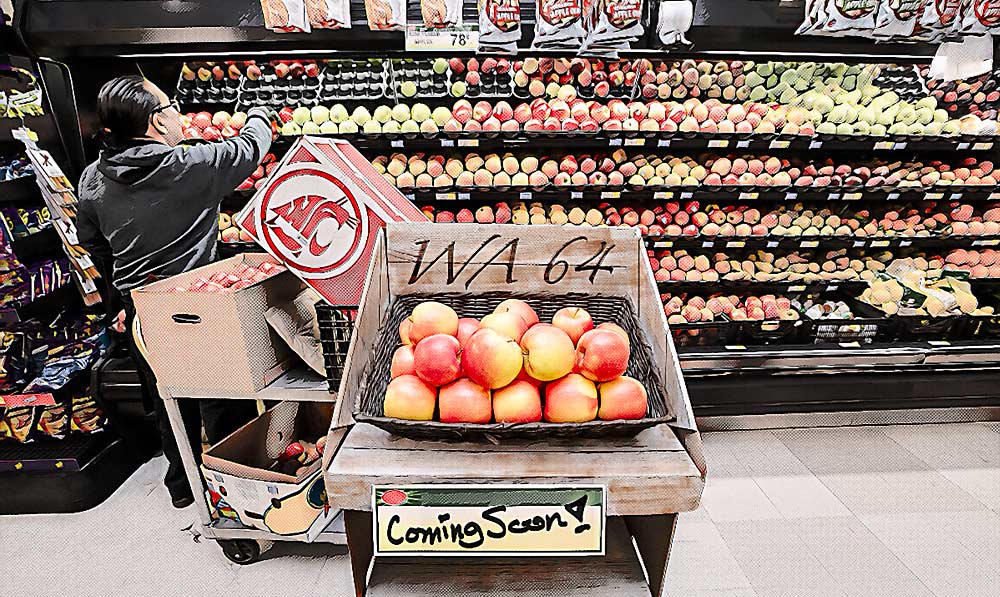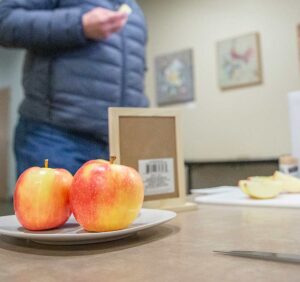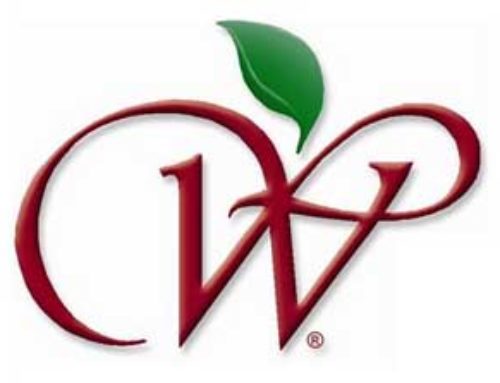—story by Ross Courtney
—photo illustration by TJ Mullinax

Washington State University’s newest apple, WA 64, is winding its way through a commercial rollout that differs from its more famous predecessor, WA 38.
Negotiations are underway for a licensee to represent the propagation of WA 64, the university is deciding on a name and researchers are planning more field days about its horticultural nuances. The first trees will be available in 2026, so fruit should hit stores in 2029.
At the industry’s request, the university intentionally crafted the process for the Honeycrisp and Cripps Pink cross to differ from that for WA 38, marketed as Cosmic Crisp.
Most noticeably, the university is taking separate bids for contracts for a license holder and a marketing agent. With WA 38, a single company, Yakima-based Proprietary Variety Management, or PVM, handles both functions.
Legally, the same company could apply for and win both contracts.
The divided process lines up with state law, said Jeremy K. Tamsen, director of innovation and commercialization for the university’s College of Agricultural, Human and Natural Resource Sciences.
“The goal is to not become entrenched with one industry operator,” he said.
Tree fruit producers sought the same division.
“It gives more power back to the industry,” said Dale Goldy, a Columbia Basin nursery owner and an original member of the cultivar licensing committee, an industry panel that advises WSU on variety management. For example, marketing desks might be able to put their own logos on WA 64 boxes, something the WA 38 marketing contract does not allow.
Splitting the two roles also makes sense to Dan Plath, committee member and president of orchard operations for Washington Fruit and Produce Co. in Yakima. It will give the university more flexibility and existing marketing desks more ownership and accountability, he said.
“Those are vastly different skill sets of people and organizations,” Plath said.
The International New Varieties Network, or INN, is negotiating for the licensee contract, which carries the responsibility of overseeing tree sales through nurseries, phytosanitary processes and tree royalties. INN was among five applicants, Tamsen said, and has member nurseries on six continents, representing dozens of apple brands.
PVM also applied for the contract, said Kevin Brandt, vice president.
The original plan was to pick a marketing agent by fall, but that decision has been pushed to sometime next year. Industry sales desks are already working independently toward the “look and feel” for the apple rollout as the university begins recruiting members for a marketing committee, Tamsen said.
Also new this go-round: a name contest. Through the spring, the university collected more than 15,000 submissions from the public. The university is now workshopping a “short list” with focus groups.
As with WA 38, Washington growers will get at least a 10-year domestic head start on production of WA 64, Tamsen said. Also as it did with WA 38, the university likely will commercialize WA 64 overseas during that startup period, giving companies in foreign lands incentive to help protect the intellectual property.
Industry leaders do not expect WA 64 to create as much excitement as did WA 38. The economic landscape has changed too much.
Goldy recalls he and his colleagues on the licensing committee warning university officials that Washington growers could plant 3.5 million WA 38 trees. As of April this year, they have planted 22 million trees in Washington alone.
“We were so wrong it was ridiculous,” he said.
This time, he’s concerned about the opposite: that WA 64 will not build up a critical volume to command shelf space — not because it’s a bad apple, but because growers are just less likely to plant these days.
Robert Kershaw, CEO of Domex Superfresh Growers, agreed.
“The economic landscape is so much different today,” he said. “The WA 64 is a great apple, but I am sure it will take a lot longer to get up to volume.”
That volume will be determined by shoppers, he said.
Industry leaders on the licensing committee discussed the idea of acreage caps but decided against that for now, Tamsen said. They want to give all Washington growers a shot at the apple, because all Washington growers invested in it.
The INN members recognize the market changes, but variety development is a long-term game.
“It never really stops,” said general manager Garry Langford of Australia.
WA 64 will enter a crowded field no matter who gets the licensee contract. Langford estimates between 60 and 100 managed varieties of apples are available around the world right now.
INN has four members in Europe; three of them have breeding programs with new apples under commercialization. Italian breeder CIV is commercializing RedPop, while, under the direction of French INN member IFO, a Brazilian breeding program has three cultivars under the brand Samboa in the market pipeline in Europe.
However, proprietary cultivars still make up less than 5 percent of the global volume. A big chunk of that is Pink Lady, the apple that blazed the proprietary variety trail. Naturally, some cultivars will fade away in the marketplace, but a stream of new varieties attracts customers for everyone, Langford said.
“We like to think that the new products are better than the ones before,” he said. •
WA 38 nears end of Washington’s exclusivity window
Washington’s head start on growing the WA 38 apple is nearing its end, unless Washington State University decides to extend that lead.
When WSU first released the apple marketed as Cosmic Crisp, it gave Washington growers a window of exclusivity in North America.
Growers in Michigan, New York and elsewhere interested in planting the apple when that expires in 2027 would want to order trees from their nursery in 2025, said Kevin Brandt, vice president of Proprietary Variety Management, or PVM, the Yakima, Washington, company contracted to manage the commercialization of the cultivar.
However, WSU could choose to extend that exclusive window through 2032, when its patent expires. A decision has not yet been made, said Jeremy K. Tamsen, director of innovation and commercialization for the university’s College of Agricultural, Human and Natural Resource Sciences.
Either way, buying nursery trees would only allow growers to plant the apple. To sell it under the Cosmic Crisp trademark, they and their packing houses would need to sign licenses with WSU.
Trademarks don’t expire.
In 2022–23, the most recent completed apple season, 5.3 million boxes of Cosmic Crisp were shipped, and the volume is expected to continue upward, Brandt said. PVM projects the current 2023–24 crop will see about 8 million boxes shipped, while 2024–25 will surpass 10 million.
The average prices for the 2022–23 season were $33.64 per box for conventional apples and $46.68 for organic. Current-season prices averaged $30.47 for conventional and $39.39 for organic, according to early May estimates made by the Washington State Tree Fruit Association.
“As almost all apple brands and varieties have suffered a price drop this year, Cosmic Crisp has been affected as well,” Brandt said. “However, these prices remain towards the top of the apple listings.”
—R. Courtney








Leave A Comment